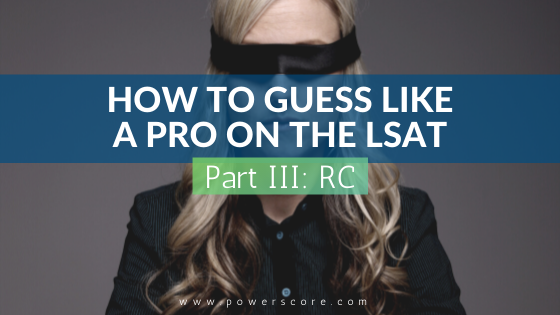If you’re going to be guessing on any LSAT questions, it will probably be on Reading Comprehension questions. Why? Because there are more questions in the Reading Comprehension section (27-28) than in any other section of the test. Moreover, it’s no secret that the complexity of the passages you will be dealing with has increased over the years, with some of the latest RC sections bordering on brutal.
While there is no penalty for guessing, you should guess wisely! Here’s how to do it on the RC section.
Blind Guessing
According to our Guessing Strategy and Probability Tables, you would be best served by always guessing answer choice (D) in the Reading Comprehension section of the test. Do not choose random answer choices; do not put in a pattern such as A-B-C-D-E etcetera. Although guessing answer choice (D) obviously does not guarantee you will get the questions correct, it gives you a better chance (21.4%) than guessing randomly (20%).
Running Out of Time
The percentage appearance of correct answer choices in the last five questions of the RC section (June 1991 – June 2016) is as follows:
- A: 16.9%
- B: 22.9%
- C: 17.9%
- D: 22.9%
- E: 19.5%
As the table indicates, if you cannot finish the last passage in the RC section, you should always guess either (B) or (D): over 45% of the time the correct answer choice is either of these two answer choices.
Narrowing Your Options
Keep in mind that the advice above holds only for pure guessing. If you can narrow down your possible choices, by eliminating even one of the five answer choices, do not make your decision on the basis of statistics alone! You’re making an educated guess, so choose one of the answer choices you have selected as possible contenders. Assuming your logic is solid, you’d have a 25% chance of getting the question right if you were able to eliminate just one answer choice. If you can eliminate two, your chances jump to 33%. If you can eliminate three and need to decide between two possible contenders, you have a 50-50 chance of getting the question right! These percentages give you a far higher probability of scoring a point than answering on the basis of statistics alone.
Confidence & Skill
Assuming your accuracy is fairly high (above 90%) on the questions you do answer, but occasionally fail to answer all the questions in your section, the following strategy would be your best bet:
Quickly review the answer choices you have already selected, and use the answer that appears least frequently as your guessing answer choice.
For example, if you have completed twenty questions in a section, and your answers contain a majority of (A)s, (C)s, (D)s, and (E)s, then guess answer choice (B) for all of the remaining questions.
Mismanaging Your Time
In RC, you get seriously penalized for mismanaging your time: perhaps even more so than in LG or LR. In Logic Games, you may be able to recover from investing 10-11 minutes in a difficult game, because there are games out there that can be solved in 6 minutes or less. No joke. Same thing with LR: there are incredibly easy questions that would take less than a minute to solve. Unfortunately, the same does not hold true for RC passages: no matter how “easy” the passage, you still need to spend the 3 – 3:30 min to read it, and another 5-6 min to answer the questions (the majority of which will require you to return to the text and dig out the relevant information: a painstaking process if you rushed in the beginning). There are no inferences in RC. No templates. No shortcuts.
Strategy
As a result of all this, it’s not uncommon to have only 5 minutes left to complete the fourth passage, which puts you in a tough spot. By the time you read the passage, time is almost up: you sink 5 min only to get 1-2 points out of them. How do you avoid this?
Pick one question from each passage, and guess on it.
As discussed in Jumping from 165 to 173: The Last Mile is Always the Hardest, it does not pay to waste 2-3 minutes on an incredibly difficult question only to miss 5 questions at the end of the section. In RC, it’s quite common for test-makers to include one really difficult question in each passage. If timing is an issue, learn to recognize such time-consuming questions and guess on them, following the guessing strategy above. By guessing on one question per passage, you may be able to complete your section: you will forfeit 4 points in the process, but gain 6-7 points from not having to guess on the entire last passage!
For most test-takers, guessing is the unfortunate reality of a speeded exam. Yes, it sucks. At the same time, if you know how to guess, it may allow you to complete the remaining questions correctly, thus raising your score! Do not underestimate the power of strategically allocating your time: knowing how to guess, if and when you need to, should be an essential element of your pacing strategy.
Continue the Series
- Pt.1: Logic Games
- Pt.2: Logical Reasoning
- Pt.3: Reading Comprehension


R says
Number 5 brought me from getting 67% of questions right to 85% and I only missed the four questions I guessed on 🙂
Dave Killoran says
Fantastic work, and that’s great news! Congrats!